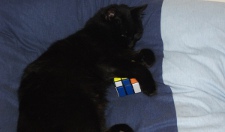Twisting Puzzles
Rubik's Cube (3x3x3)

The Rubik's Cube was invented in 1974 by Ernö Rubik. By the end of the decade, the magic cube or Büvös Kocha (Hungarian for 'magic cube') was being mass produced around the world. For many, the cube is synonymous with the 1980s. The craze fizzled out for a while until a new generation of lightning fast puzzle solvers started to emerge from about 2003 onwards. Now there are tournaments across the world and the market in vintage as well as new puzzles is huge.
It doesn't really matter how many other twisty puzzles are made, the plain old 3x3x3 cube is still the puzzle that most people start with and keep coming back to. Many other puzzles are based on the ingenious mechanism at the heart of the puzzle.
If you are starting off, a standard Rubik's cube is more than enough until you learn how to solve it. With a bit of practice, even the simplest methods to solve the cube can be executed in around a minute. After that you'll need to look at finding more efficient ways to solve the puzzle, getting a better cube and learning some finger tricks to speed up your times. The world record for solving the cube is a little over 7 seconds. 10 - 20 seconds could be considered expert (although there are a lot of people around the world who can do that). Averaging under 30 seconds from random positions is a pretty good achievement and can't really be done without a fair amount of work.
The cube in the image is a Type F cube. It has hollow pieces, the caps can be removed and screws adjusted to tighten and loosen the action. The pieces are hollow and very light. With a bit of puzzle lube it turns very well. Type C cubes are fairly popular and turn pretty well too. The Rubik's own brand cubes are varied. The main retail product in the UK using the brand is a little stiff, can't be adjusted and only gets quick when very well worn and given a big dose of puzzle lube. The DIY version from the Rubik's site isn't too bad but I still find it tends to stick a little with my awful finger tricks. I have a transparent, glow-in-the-dark Type C that I also like to use. Neither this or the Type F ever pop on me when solving quickly (for me). You can get a decent cube online for around £5-10 - look at some of the cube sites with a forum and read or watch reviews of the puzzles before buying.

